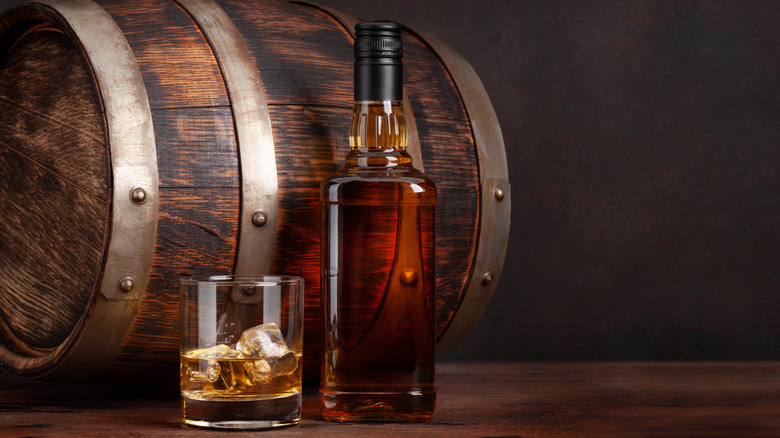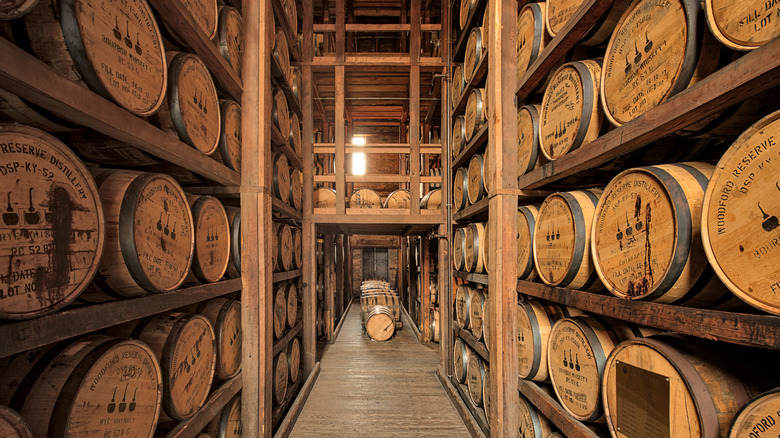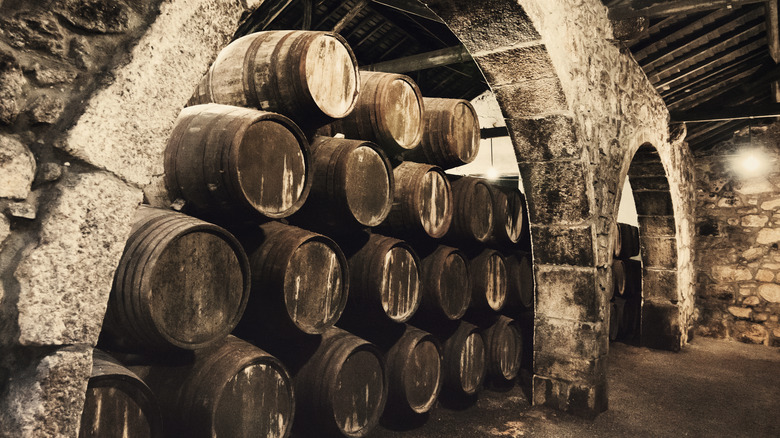We Have To Know: What Does Aging Even Do For Liquor?
Spending time around whiskey aficionados can sometimes sound like parents talking about their children. Ages are being thrown around left and right, and those in the know might even have something to say about a 15 year old versus a 12 year old, but what does all of this aging have to do with liquor in the first place?
When people talk about aging liquor, they're most often talking about barrel aging. This is because holding onto a bottle of whiskey, unlike a bottle of wine, won't have any effect on its flavor. That same time spent in a barrel, though, might entirely change its flavor depending on the barrel it's aged in.
Barrel aging is what gives whiskey its color, but it also does much more than that. Aging whiskey — or any other spirit, including gin — mellows out the harsher flavors of the neutral spirit, and adds characteristics of the barrel as well. The exact flavors that are being added are going to be dependent on the barrel that's used, its char, what it held before, and even the climate where it's stored.
How time affects flavor
The reason that the age of a scotch or bourbon whiskey is so important is because it tells you a lot about the drinking experience you're in for. The longer these whiskeys are kept in the barrel, typically the more mellow they will be. They will also have a considerable amount of depth to the whiskey's flavor because they have more time to draw the flavors out of the wood. Many distilleries will choose the wood used for their barrels based on the flavors it will impart on their spirits.
For example, someone may choose Mongolian oak to add a spicy, peppery flavor to their sherry as it ages. On the other hand, bourbon must be aged in charred white oak barrels. The char refers to the interior fire scorching given to the barrels. This char caramelizes the natural sugars and flavor compounds in the barrels. This gives bourbon its signature notes of vanilla, caramel, and toasted spices. Some of those flavors come from the grains that go into the mash, but the thing that really makes a bourbon is the time it spends in the barrel.
The same goes for scotch. It's typically aged for much longer because it must be made in Scotland's cold climate. That means it takes longer for the whiskey to work its way in and out of the wood compared to the varying temperatures found in most of the United States.
Barrel finishing
Another key difference between scotch and bourbon is that scotch can be aged in any barrel that the distiller would like. This opens the door for barrel finishing. Some scotches will be primarily aged in a former bourbon barrel to obtain the same flavors, before spending time in a port, sherry, or red wine cask. During these aging periods, the scotch will pick up the flavors of the spirits that the barrel had previously held. This can add a further level of depth in the hands of a good distiller.
Whiskeys aren't the only spirits that are aged, of course. Sherry, tequila, and rum are also often barrel aged. This barrel finishing not only mellows out the harsher natural flavors of these spirits, but will also give distillers more creativity. They can combine a sweet rum with the fiery notes of a rye barrel, or add the tannins and dark berry notes of a strong red wine. Looking out for products that have been barrel-aged or barrel-finished usually means you're getting a unique expression of a particular spirit, and are going to be a fun way to experience your favorite spirits.


